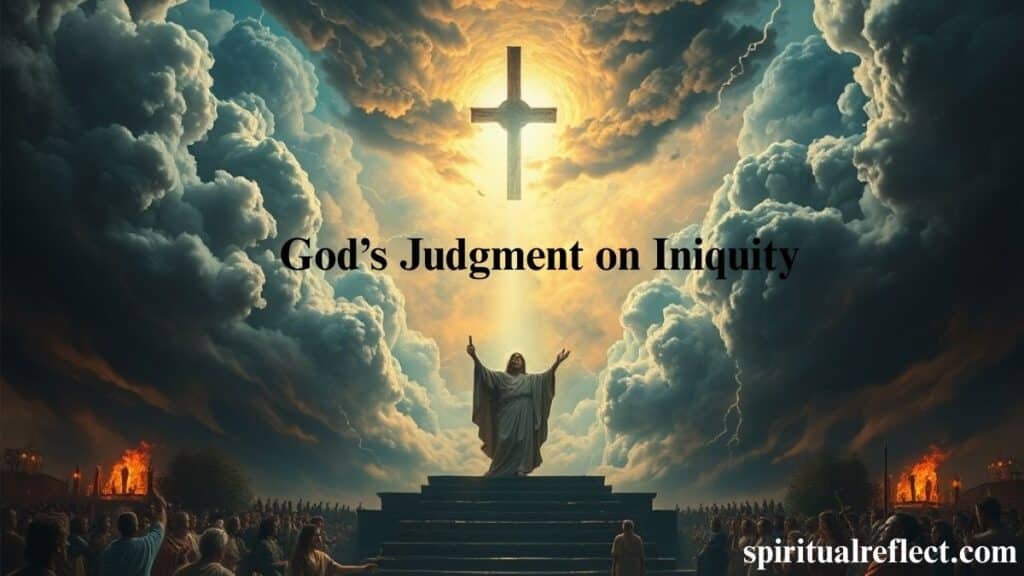Iniquity in the Bible: What It Means and Why It Matters refers to the deep, ingrained moral corruption that goes beyond a single wrongful act. In Scripture, it signifies a twisting of the heart away from God’s standard of righteousness, often linked with willful rebellion and persistent disobedience. Unlike simple mistakes or occasional sins, iniquity describes a condition that distorts a person’s character and erodes their connection with God.
Across the pages of the Bible, iniquity emerges as a silent but destructive force, shaping nations, hardening hearts, and bringing divine judgment. Yet within those same pages, it becomes the backdrop against which God’s mercy shines brightest, offering hope to even the most broken. This tension between corruption and grace gives the subject a depth that speaks powerfully to every generation.
Exploring iniquity in the Bible unveils more than theological definitions—it reveals the spiritual battlefield of the human heart. From ancient kings to entire civilizations, its presence leaves a trail of consequences. But it also highlights God’s redemptive plan to cleanse, restore, and transform. Understanding this truth invites readers to confront the hidden distortions within and embrace the life-changing power of divine forgiveness.
Defining Iniquity: More Than Just “Sin”

The word “iniquity” appears in both the Old Testament and New Testament, but its meaning goes deeper than most modern readers realize.
- Hebrew (Old Testament) — ‘avon (עָוֹן) means “crookedness,” “perversity,” or something twisted away from the right path.
- Greek (New Testament) — anomia (ἀνομία) literally means “lawlessness,” a deliberate rejection of God’s moral order.
Iniquity isn’t just an action — it’s a condition of the heart.
It’s a moral distortion that warps judgment and erodes godliness, often leading to persistent disobedience.
“Your iniquities have separated you from your God; your sins have hidden his face from you.” – Isaiah 59:2
Think of sin as missing the mark. Iniquity is bending the bow on purpose so it can’t hit the target at all.
Sin, Transgression, and Iniquity — Key Distinctions
While the Bible sometimes uses these words interchangeably, there’s a progression between them.
Here’s a breakdown:
| Term | Biblical Definition | Root Language & Meaning | Nature | Example Verse |
|---|---|---|---|---|
| Sin | Falling short of God’s standard | Hebrew: chatta’ah — “to miss the mark” | General wrongdoing | Romans 3:23 |
| Transgression | Crossing a known boundary | Hebrew: pesha’ — “to rebel” | Willful violation | Daniel 9:11 |
| Iniquity | Deep moral corruption | Hebrew: ‘avon — “perversity, crookedness” | Habitual, premeditated evil | Psalm 51:2 |
Example:
- Sin: Speaking harshly in anger.
- Transgression: Knowing it’s wrong but doing it anyway.
- Iniquity: Justifying and repeating the behavior until it shapes your character.
The Progressive Nature of Iniquity
Iniquity rarely appears overnight. The Bible describes it as something that grows when sin is left unaddressed.
Stages of Progression:
- Temptation → brief moral lapse (sin).
- Rebellion → repeated willful violation (transgression).
- Corruption → hardening of the heart into persistent wickedness (iniquity).
Romans 1 shows this downward spiral: people first ignore God, then justify their actions, until finally they celebrate what God calls evil.
“They are filled with all manner of unrighteousness, evil, covetousness, malice…” (Romans 1:29)
Unchecked, iniquity can blind a person, sear the conscience, and result in spiritual death.
Old Testament Examples of Iniquity

King David
In 2 Samuel 11, David commits adultery with Bathsheba and arranges the death of her husband.
Later in Psalm 51:2, he cries:
“Wash me thoroughly from my iniquity, and cleanse me from my sin.”
This wasn’t just a one-time slip. David plotted, covered up, and justified his actions — a classic case of iniquity.
The Israelites
Repeatedly in books like Ezekiel and Jeremiah, Israel turned to idolatry despite clear warnings.
Their generational sin was not mere error; it was willful rebellion against their covenant with God.
Before the Flood
Genesis 6:5 describes a world where:
“Every inclination of the thoughts of the human heart was only evil all the time.”
That’s moral corruption at a universal scale — the ultimate picture of human depravity.
New Testament References to Iniquity
Jesus spoke bluntly about iniquity. In Matthew 7:23, He warns religious hypocrites:
Paul in 2 Thessalonians 2 connects lawlessness (anomia) to the “man of sin” who defies God.
John in 1 John 3:4 makes it plain: “Sin is lawlessness.”
The New Testament makes clear: iniquity is the deliberate casting aside of holiness in favor of self-rule.
God’s Judgment on Iniquity

The Bible teaches that God’s justice demands that He deal with iniquity.
- Sodom and Gomorrah (Genesis 19) — cities destroyed for entrenched wickedness.
- Babylon (Isaiah 13) — judged for pride, oppression, and idolatry.
- Canaanites (Genesis 15:16) — God delayed judgment until their iniquity was full.
Principle:
God is patient, but persistent; unrepentant iniquity eventually brings divine justice.
God’s Mercy Toward Iniquity
Here’s the paradox: God is both just and merciful.
Exodus 34:6-7 describes Him as:
“…abounding in love… forgiving iniquity, transgression, and sin, yet not clearing the guilty.”
- Mercy: God offers forgiveness to the repentant.
- Accountability: He does not excuse or ignore persistent unrepentance.
Jesus and the Bearing of Iniquities
The prophet Isaiah foretold this in Isaiah 53:5-6:
“…the Lord has laid on him the iniquity of us all.”
Jesus didn’t just die for sins in the abstract — He bore the full weight of human moral corruption.
This is the heart of Christ’s atonement: removing spiritual defilement so people can be restored to holiness.
God’s Promise to Remove Iniquity

Throughout Scripture, God promises a day when He will cleanse His people fully.
- Zechariah 3:9 — “…I will remove the iniquity of this land in a single day.”
- Jeremiah 31:34 — “…I will forgive their iniquity, and I will remember their sin no more.”
Under the New Covenant, believers experience this cleansing through grace and faith in Jesus.
Overcoming Iniquity Today
If iniquity is a heart condition, overcoming it requires more than behavior modification — it requires heart transformation.
Practical Steps:
- Confession — Proverbs 28:13: “Whoever conceals their sins does not prosper, but the one who confesses and renounces them finds mercy.”
- Repentance — turning from wickedness toward righteousness.
- Accountability — surrounding yourself with people who speak truth into your life.
- Scripture Immersion — renewing the mind with God’s Word.
- Prayer for Cleansing — echoing David: “Create in me a clean heart” (Psalm 51:10).
Conclusion
Iniquity in the Bible: What It Means and Why It Matters shows us that wrong actions are not the only problem. The real danger is a heart that becomes twisted and unrepentant. Iniquity damages our relationship with God and blinds us to truth. The Bible warns that it leads to judgment, but also promises mercy to those who turn back to Him.
Understanding Iniquity in the Bible: What It Means and Why It Matters helps us see both the seriousness of sin and the beauty of God’s grace. It calls us to examine our hearts, confess our wrongs, and seek His cleansing. God’s forgiveness can remove iniquity and restore us to a life of righteousness. Iniquity in the Bible: What It Means and Why It Matters. This truth is not just ancient wisdom—it is a personal invitation to walk in freedom and live close to Him today.

Rana Ahmad is the creator of Spiritual Reflect, where she shares insights on personal growth, mindfulness, and meaningful living to inspire a more intentional life.







